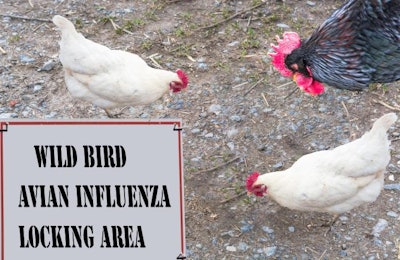
New cases of highly pathogenic avian influenza (HPAI) are reported in laying hens and emus in Australia, as well as among native chickens in Taiwan. The disease has returned to Russia’s Siberia, and a mild form of the virus has been detected again in South African ostriches after a one-year absence.
Avian influenza persists in Australia
A second layer flock belonging to Farm Pride Foods has tested positive for the H7N7 HPAI virus, the Australian egg company reports.A free-range egg flock of 40,000 hens was involved in the latesat case.
As in the previous outbreaks reported in Australia over the past month, the infected premises is in the Lethbridge area of the state of Victoria. Total losses so far — around 380,000 birds or 33% of its total flock — are estimated to have reduced the company’s net revenue for the current year by 18-23 million Australian dollars (AUD; US$13.0-16.5 million).
Having depopulated the flocks involved in two previously confirmed HPAI outbreaks, the agriculture department for the state of Victoria reports that these premises are now undergoing decontamination to eliminate the virus. On August 7, the state’s chief veterinarian ordered all poultry owners in Golden Plains Shire — which includes Lethbridge — to keep their birds housed for the following 30 days.
One local source has reported avian flu in a flock of emus. Affected were 6,000 of the birds at Kerang in northern Victoria, reports Weekly Times Now.
Following an absence of more than six years, the H7N7 HPAI virus was first detected in Australia around one month ago. Its presence was confirmed at two premises in the Lethbridge area in the southwest of Victoria. Affected were a free-range layer flock of 355,000 birds, and another totaling 43,500 hens kept in a variety of systems (free-range, cages, and barns). At around the same time, a low-pathogenic H5N2 avian flu virus was detected in turkeys at two different locations in the same state.
Taiwan registers five new HPAI outbreaks
Taiwan’s Council of Agriculture has informed the World Organisation for Animal Health (OIE) of five new confirmed outbreaks of HPAI linked to the H5N5 virus variant.
Occurring between July 27 and August 8, the outbreaks directly involved more than 45,600 poultry in total, all native chickens. More than 6,830 of the birds died, and the rest have been destroyed. One of the affected premises was a backyard flock of just five birds. The others were on farms, where significant levels of mortality were observed.
These latest cases bring Taiwan’s total outbreaks linked to this virus subtype since September of last year to 42.
HPAI returns to Russia’s Siberian region
Three outbreaks of HPAI linked to an H5 virus have been confirmed in different districts of Omsk oblast in the Siberian federal district.
According to the official report to the OIE, the mortality rate among the 543 poultry affected was almost 50%. Source of the present infection is unknown.
Restriction zones have been established around the two village flocks and one backyard, reports the agriculture ministry. An epidemiological investigation has been started, while culling and disposal of the carcasses are in progress. No products from the infected flocks have been traded.
HPAI was last reported in this area in May of 2019. Omsk oblast shares a border with Kazakhstan, and one of the new outbreaks is in a district close to the international frontier.
South Africa reports return of mild avian flu in ostriches
Nine cases of avian flu have been detected in a flock of 590 commercial ostriches in the far south of Western Cape Province, according to the OIE.
In mid-July, a sub-clinical infection was detected, reports the agriculture department. No birds are reported to have died, or to have been culled to control the spread of infection.
The last time this virus was detected in South Africa was in May of 2019.
Bulgaria, Iraq declare HPAI 'resolved'
HPAI situation linked to the H5N8 virus has been resolved in Bulgaria. According to the agriculture ministry’s report to the OIE, there was just one outbreak of the disease in the county of Plovdiv in early June. The virus has not been detected in the region since that time.
Iraq’s veterinary authority has also reported to the OIE that HPAI has been resolved in the country. The declaration also followed a single outbreak linked to the same virus subtype at an isolated farm in May of this year.
HPAI situation in Europe
Latest update from the Animal Disease Notification System of the European Commission reveals no new HPAI cases in Europe.
Recorded on the system are 325 outbreaks in poultry so far this year.
Of the total, 273 outbreaks were in Hungary, with the most recent cases in early June. At around the same time, Bulgaria recorded the most recent of its nine outbreaks. Up to the end of March, Poland registered 32 outbreaks, but none since that time.
Up to three outbreaks have been confirmed in the Czech Republic, Germany, Romania, Slovakia, and Ukraine – all within the first three months of 2020.
View our continuing coverage of the global avian influenza situation.

















